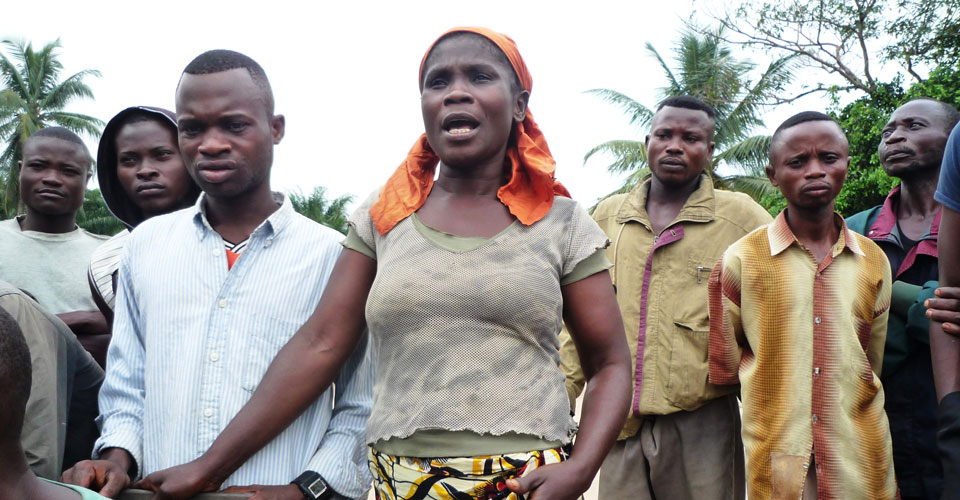DRC:
Logging in the DRC: Taking the lift or the stairs?

“The loggers in our forests are taking the lift, while the benefits for communities have taken some very bad stairs,” says Denis Impiti, describing the forest sector in the Democratic Republic of Congo (DRC). Denis has been campaigning for over a decade to secure the rights of forest people in the country.
One of the great promises of the DRC’s timber trade was that it would bring local communities schools, roads and health centres. In a country where the state is almost non-existent, this was seen as the path to development.
The country’s Forest Code theoretically ensures that companies negotiate with communities – before they start operating – over the financing of social infrastructure via social agreements. But in the remotest parts of the country it is extremely hard for communities to know their rights, let alone enforce them. The loggers are seldom held to account, meaning their promises can turn out to be empty.
Denis Impiti, Julien Mathe and Cyrille Adebu are members of the Natural Resources Network (Réseau Ressources Naturelles), a coalition of civil society groups that is working to redress this power imbalance by training communities in the three most-forested provinces of the country, Bandundu, Equateur and Orientale in legal matters, conflict resolution, project monitoring and financial management.
Together, these organisations have visited around half of the country’s 80 forest concession areas, and worked with 60 communities totalling more than 120,000 people. All too often these people have seen the forests they rely on for everything destroyed, and the profits shared among logging companies and corrupt officials. Either they were left out of negotiation processes altogether or their demands had fallen on deaf ears.
Denis and colleagues are helping change that. In Orientale Province, the NGO OCEAN has worked with communities to renegotiate a social agreement with a logging company that allowed them certain rights within its concession. Any trees that could be used to build canoes or collect caterpillars (an essential source of protein for local people) were marked so that loggers would know to leave them untouched. In Equateur Province, a company that had budgeted US$5,000 to build two schools had to increase this to US$34,000 after the NGO GASHE told the authorities that the company’s plans were significantly sub-standard.
With this kind of assistance, communities are also holding industry to account on the terms they negotiate. In Bandundu province, Denis helped villagers push a concessionaire to pay US$15,000, the ten per cent advance on the total estimated value of the community share, as required by law. The company tried to shirk its remaining payments but the community stopped it from logging until it paid up. In Orientale Province, the president of a community committee that was managing these proceeds from logging was jailed when it transpired that he had embezzled the 10 per cent advance payment. That committee was then assisted by OCEAN to re-establish itself with rules and procedures that would guard against corruption and fraud.
In some cases, communities decided to say no to logging altogether. In one small community, Monzelege, villagers refused to sign a new agreement with a logging company, having lost all trust in the company’s ability to fulfil it. They are instead insisting that their forest is community-managed.
Members of the Natural Resources Network shed light on how few of the DRC’s logging companies are respecting their social obligations, and how crucial it is for citizens to play an active and informed role in the management of their forests. The government’s response however has been worrying – the Ministry of Environment has lowered the requirements for concessionaires, and challenged the Network on the number and content of the contracts the state had already signed.
Civil society groups like GASHE, OCEAN and CRONGD cannot go it alone in the DRC; they need buy-in from the government and external pressure from the international community. With such a common front, they will be able ensure that community benefits are, at the very least, sharing the lift with logging companies, or that communities are even sending them home.
